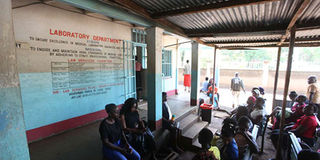Premium
Nyong’o says Kisumu health law to help revamp sector

Patients at Kisumu County Referral Hospital. Governor Anyang’ Nyong’o has outlined a raft of measures that his administration will use to address the emerging issues which are threatening to cripple the health sector PHOTO | FILE | NATION MEDIA GROUP
What you need to know:
- Mr Ager says the Bill will facilitate ring-fencing of funds meant for the health sector.
- It proposes establishment of a county health fund whose administrator will be appointed by the Finance CEC.
- Due to UHC, hospitals which used to handle 5,000 patients in a day saw the numbers shoot up to almost 11,000.
Kisumu Governor Anyang’ Nyong’o has outlined a raft of measures that his administration will use to address emerging issues which threaten to cripple the health sector in the county.
Prof Nyong’o is hoping to rely on the full implementation of the Kisumu County Health Bill, 2020. But he has stated that the measures will not be effected overnight.
Through his Director of Press Unit Aloice Ager, the governor said that the recently passed Bill could be the silver bullet that will help solve problems such as health financing which, to him, is the source of a number of challenges witnessed in hospitals.
HEALTH BILL
Governor Nyong’o has since returned the Bill to the House with some recommendations to fine-tune it before he assents to it.
“The county is making all attempts to sanitise the health sector and [through] the health Bill, we will be able to address the issue of delayed disbursement of funds,” said Mr Ager.
Mr Ager said the Bill will facilitate ring-fencing of funds meant for the health sector to cushion hospitals from the financial crisis that they are currently facing.
It proposes establishment of a county health fund whose administrator will be appointed by the Finance CEC. The administrator will ensure that money held in the fund, including accruals, is retained, ring-fenced and fully earmarked for health services.
USER FEES
Initially, there was the Facility Improvement Fund, which was revenue collected by public hospitals as user fees paid to defray the costs of running hospitals.
The fund enabled hospitals to manage their day-to-day expenses and was also used for purchase of emergency supplies.
With Level Five hospitals falling under counties following the devolution of health, accounts which held the user fees were closed and the funds banked with county treasuries.
DELAYED DISBURSEMENT
Getting these funds back after banking has been challenging due to delays in disbursement, resulting in disruption of services in hospitals.
“The health fund will consist of monies allocated and appropriated from the county revenue fund, user charges, grants, gifts, donations, loans or other endowments given to the fund,” said Mr Ager.
It will be spent on medical supplies, equipping hospitals and general operations and maintenance.
The move by the governor follows challenges in the sector as witnessed in the Universal Health Coverage (UHC) piloting assessment and a report by an ad hoc committee of the Kisumu County Assembly on the deplorable condition of hospitals in the county.
FOOD AND WATER
The assembly report revealed that in some hospitals, patients lack food and water while others had their electricity disconnected for not settling bills accumulated over time.
Kisumu was to receive Sh876 million for UHC piloting but has so far received Sh417.6 million.
“During the piloting face, the number of patients accessing facilities in the county went up by 114 per cent. This was the case despite the [funds] shortfall due to lack of disbursement, leading to the shortage of supplies,” said Mr Ager.
SOARING NUMBERS
He indicated that hospitals which used to handle 5,000 patients in a day saw the numbers shoot up to almost 11,000.
“When you have such a high number and you do not have funds, there must be shortages. Many people also abandoned NHIF for the free UHC which is being starved of funds,” said Mr Ager.
He said the county had to cater for the shortfall, thereby affecting other services.
Mr Ager also downplayed concerns on use of water from boreholes by hospitals, saying the quality is high. He said the water is used to supplement supplies from Kisumu Water and Sanitation Company.





